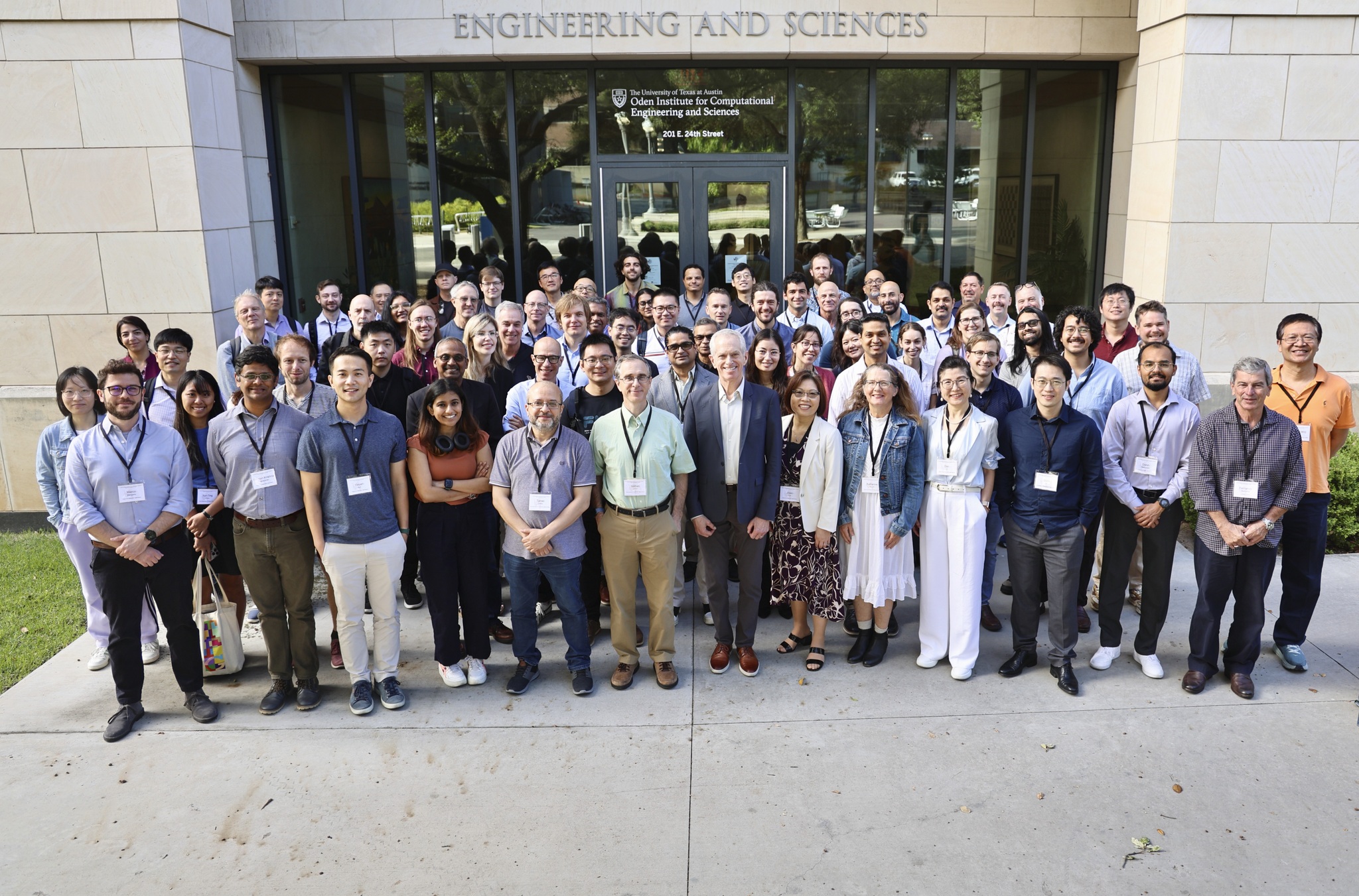
The group’s main research interest is understanding the general circulation of the ocean and its role in the global climate system. As part of the NASA-supported “Estimating the Circulation and Climate of the Ocean” (ECCO) consortium, the group is applying Bayesian inverse methods and scientific machine learning to produce optimal estimates of the time-evolving state over the past few decades of the global ocean and sea ice. ECCO products support ocean circulation and climate variability research on time scales of days to decades. Emerging research foci are understanding the dynamics of sea level change, the provision of formal uncertainties along with these estimates and implications for improving the global ocean observing system for climate. The research group is also active in cryospheric science by improving simulations of coupled sea ice-ocean dynamics in the Arctic. Furthermore, the group is investigating the polar ice sheets (Antarctica and Greenland), their dynamics, their interaction with the ocean, and their contributions to global sea level rise.
Website
Directors

Faculty and Research Staff
Postdocs
Students
Staff
Members outside the Oden Institute
Billy Moses
Overview:
The group applies advanced computational methods to improve the understanding of the role of the ocean, sea ice and polar ice sheets in the global climate system. The research rests on the recognition that these Earth system components remain insufficiently sampled by observations. Applying Bayesian inverse methods and scientific machine learning, the group works toward optimal extraction of information contained in available observations through formal synthesis with known dynamics that are encapsulated in the governing equations of motion and rendered in state-of-the-art numerical models. Improved mechanistic understanding along with uncertainty characterization are essential prerequisites for developing robust climate predictions with quantified uncertainties. CRIOS is involved in a number of formal and informal, national and international research collaborations, including the UK, Norway, Germany, Japan, and Australia. The group is pursuing several main research thrusts.
Global ocean parameter and state estimation in support of climate research:
A central focus of CRIOS is on sustaining and improving the production of ocean state estimates to support global and regional ocean circulation and climate variability research on time scales of days to decades. CRIOS is a core member of the NASA-funded "Estimating the Circulation and Climate of the Ocean" (ECCO) consortium, together with colleagues at JPL/Caltech, MIT, and AER. ECCO is one of the nation's leading global ocean data assimilation efforts. Some emerging research problems tackled by CRIOS members are:
1. characterizing and understanding the dynamics and variability of the global and Atlantic Meridional Overturning Circulation (AMOC) in terms of the underlying three-dimensional ocean circulation;
2. understanding the dynamics of global and regional sea level change, the role played by ocean dynamics in explaining regional sea level variability, and the partition of observed changes into thermosteric and mass contributions;
3. developing a computational framework for characterizing and quantifying uncertainties associated with the sparse observations, the initial and boundary conditions, and the model parameters;
4. developing formal methods for quantitative observing system design in support of regional and global observing campaigns.
Simulating the coupled Arctic ocean-sea ice system:
A second broad area of research targets the marine-based and marine-terminating cryosphere. Through NSF funding the group is improving simulations of coupled sea ice-ocean dynamics in the Arctic Ocean. Fundamental research questions here pertain to potential links between ocean circulation changes in the Arctic and North Atlantic and the decline of Arctic sea ice cover. A related research question is with regard to implied Arctic/subpolar North Atlantic freshwater balances and their role in subpolar North Atlantic Ocean dynamics. CRIOS is also getting involved with coupling the ocean's physical state with biogeochemical, biological, and ecosystem properties.
Dynamics of the polar ice sheets and their contribution to global sea level rise:
A third area CRIOS is investigating is the polar ice sheets, their dynamics, their interaction with the ocean, and their contributions to sea level change. Of particular interest is understanding the role of glacier-fjord (Greenland) and ice shelf/stream-ocean interactions (Antarctica) in the observed mass loss of the Greenland and Antarctic ice sheets, and the potential for future abrupt destabilization and accelerated sea level rise. Another research thrust pertains to the development of dynamically consistent ice sheet (or coupled ice sheet-ocean) initialization schemes to enable skillful predictions.
Computational tools:
Much of the group’s work involves the use of advanced methods of computational science and engineering, in particular, Bayesian inverse methods, state and parameter estimation, uncertainty quantification, and scientific machine learning. Some of these methods have in common the use of derivative forms of Earth system models, in particular adjoint and Hessian model codes. The use of differentiable programming and algorithmic differentiation-enabled adjoint code generation and maintenance for Earth system models is being expanded.
Projects
U.S. Projects:
ECCO: Understanding Sea Level, Ice, and Earth’s Climate
NASA PO (through 11/2021)
PI: I. Fukumori (JPL/Caltech); UTA PI: P. Heimbach
https://ecco-group.org
Advancing Collaborative Connections for Earth System Science (ACCESS): Data Access and the ECCO Ocean and Ice State Estimate
NASA ACCESS (through 9/2020)
PI: P. Heimbach
Attributions of past regional sea level variations and projection of future sea level changes
NASA N-SLCST (through 6/2024)
PI: T. Lee (JPL/Caltech); UTA PI: P. Heimbach
https://sealevel.nasa.gov
Toward seamless simulation, estimation, and prediction of weather and climate with the GEOS/ECCO coupled model and data assimilation system
NASA MAP (through 6/2024)
PI: D. Menemenlis (JPL/Caltech); UTA PI: P. Heimbach
Paleochronometry as a control problem for recovering holocene climate variations over the Greenland Ice Sheet
NSF P2C2 (through 8/2022)
PI: P. Heimbach
Collaborative Research: Leveraging the AMOC arrays and models to understand heat and fresh- water transports in the North Atlantic
NSF OCE (through 8/2022)
PI: P. Heimbach; Co-PI: H. Pillar
Collaborative Research: Understanding the controls on spatial and temporal variability in ice discharge using a Greenland-wide ice sheet model
NSF OPP (through 6/2021)
PI: P. Heimbach
Collaborative Research: Understanding Arctic System Change Through Synthesis of Hydrographic and Sea Ice Observations from the early 21st Century
NSF OPP (through 6/2021)
PI: A.T. Nguyen; Co-PI: P. Heimbach
Collaborative Research: Research Networking Activities in Support of Sustained Coordinated Observations of Arctic Change
NSF OPP
PI: A.T. Nguyen; Co-PI: P. Heimbach
International Projects:
MAGAL Constellation — Setting the cornerstone of a future ocean and climate change monitoring constellation, based on radar altimeter data combined with gravity and ocean hydrographic measurements
UT Austin-Portugal Program
PIs: B. Tapley (UT/CSR) & P. Heimbach
Subpolar North Atlantic Processes - Dynamics and pRedictability of vAriability in Gyre and OverturNing (SNAP-DRAGON)
UK NERC & US NSF
PI: H. Johnson (Oxford, UK); UTA PI: P. Heimbach
Advanced Climate Education and Research (ACER)
Research Council of Norway’s International partnerships for excellent education, re- search and innovation (INTPART) program
PI: Oyvind Paasche, University of Bergen, Norway; UTA PI: P. Heimbach
Assimilation of High Resolution GOCE based MDT in Global Ocean State Estimation – GOCE4GOSE
Technical University of Munich (TUM) International Graduate School of Science and Engineering (IGSSE)
PI: R. Pail (TUM, Germany); UTA PI: P. Heimbach

News
Dec. 5, 2025
The AIDT4ES Workshop brought together nearly 100 experts to explore how artificial intelligence and digital twin technology can enhance Earth systems modeling. Researchers showcased innovations ranging from tsunami early warning systems to earthquake simulations and ocean-ice modeling.

Profile
Sept. 16, 2025
Peter O’Donnell, Jr. Postdoctoral Fellow Dhruv Apte studies climate and ocean–ice systems at the Oden Institute, building on a Ph.D. at Virginia Tech in multi-phase, cavitating flows.

News
March 11, 2025
From flying paper planes to building robot hands, explore how the Oden Institute's hands-on activities at STEM Girl Day at UT introduced thousands of young learners to the world of computational science.